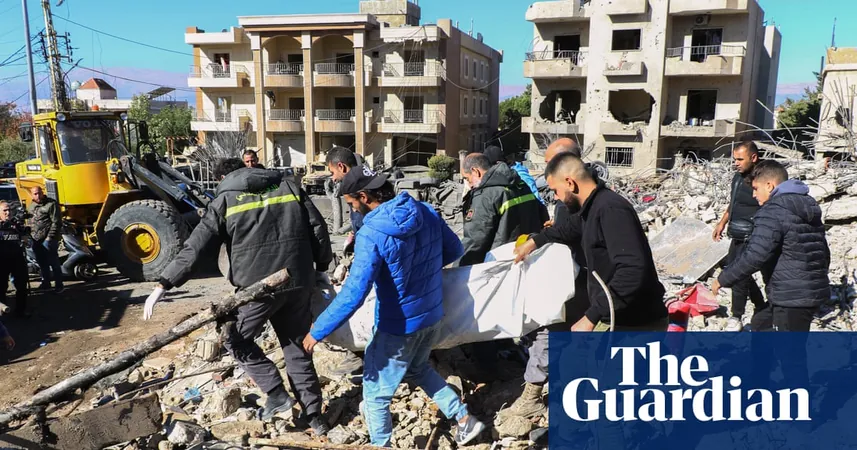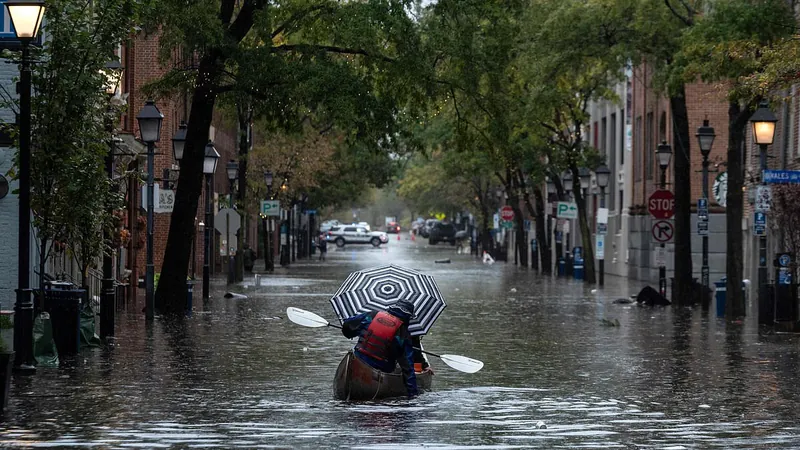
A Nation Mourning: The Heart-Wrenching Aftermath of Israel's Airstrike on Lebanon’s Civil Defence
2024-11-18
Author: Lok
The devastation was palpable as rescuers combed through the wreckage of the Douris civil defence centre near the ancient town of Baalbek, Lebanon. The remnants of what was once a hub for first responders lay scattered, with lifeless bodies and charred remains marking the grim scene left by an Israeli airstrike that claimed the lives of 20 people, including 15 emergency workers. The impact of the explosion was so severe that five victims were unrecognizable, prompting teams to continue collecting remains for DNA identification long after the incident.
The attack, which occurred late Thursday night, exacerbated an already dire humanitarian crisis. Since the outbreak of hostilities between Israel and the Lebanese Shia militia Hezbollah last year, over 3,481 lives have been lost in Lebanon; approximately 80% of these fatalities have occurred since Israel intensified its campaign in late September. This latest round of conflict has also displaced 1.2 million people and left significant portions of the country in ruins.
Amidst the chaos, there were reports that Hezbollah may be amenable to a ceasefire proposal mediating from the U.S., as the group grapples with the loss of many senior leaders and thousands of its combatants.
In the wake of the airstrike, the bewilderment and sorrow among surviving civil defence personnel were evident. The Douris centre operated under governmental authority, raising questions about the rationale behind targeting such an entity. “We never imagined this could happen to the civil defence centre. We were registered with the ministry of interior; what more assurance could we have?” lamented Atta Mansour, head of the local Shifaa rescue service.
Among those who perished was Bilal Raad, the head of the civil defence for the Baalbek-Hermel region—Lebanon’s largest province. Just days before his death, Raad had expressed urgent concern for the region's lack of a life-detecting device, which he believed could save lives by identifying those trapped under debris. His tragic loss seemed particularly poignant to Rami Rajeh, who has been fundraising to equip the civil defence services. Rajeh noted, “Ironically, the very device that could have detected life beneath the rubble was the one Bilal sought for his centre.”
As the harrowing scenes in Douris unfolded, they echoed a grim trend across Lebanon, where more than 200 emergency responders have lost their lives to Israeli bombardments. Medical workers and government officials accuse Israel of systematically targeting rescue teams, compounding the devastation. Israel, for its part, defends its actions by claiming that Hezbollah hides soldiers and armaments within civilian infrastructure, a claim for which they have not provided evidence.
In Tyre, another city in southern Lebanon, Moussa Nasrallah, the newly appointed chief of the civil defence, conveyed similar sentiments of frustration and despair. He highlighted that Israeli strikes frequently obstructed ambulances from reaching the wounded, often allowing access only after substantial delays. This tragic delay can turn a rescue mission into a retrieval operation, with trapped individuals ultimately succumbing to their injuries.
The impact of the conflict has severely undermined Lebanon’s healthcare system, with more than 60 attacks on medical facilities reported in the past year. Most prominently, eight hospitals have been forced to close, echoing the staggering toll seen in Gaza, where systematic healthcare dismantling has been noted.
As the rubble of the Douris civil defence centre began to settle, the daily reality for those left behind became a grim testament to the ongoing violence. Residents of Baalbek, seemingly undeterred by prior evacuation orders, continued their lives in fear and uncertainty. “Israel is trying to terrorise people. It is not discriminating between civilians, ambulances, or anything,” Mansour stated, referring to the blood-soaked remnants where the crisis unfolded.
As the world watches, Lebanon is left grappling with its losses, showing that amidst the chaos of war, the most profound tragedies are felt by those who dedicate their lives to saving others. The question remains: will there ever be a respite?




 Brasil (PT)
Brasil (PT)
 Canada (EN)
Canada (EN)
 Chile (ES)
Chile (ES)
 España (ES)
España (ES)
 France (FR)
France (FR)
 Hong Kong (EN)
Hong Kong (EN)
 Italia (IT)
Italia (IT)
 日本 (JA)
日本 (JA)
 Magyarország (HU)
Magyarország (HU)
 Norge (NO)
Norge (NO)
 Polska (PL)
Polska (PL)
 Schweiz (DE)
Schweiz (DE)
 Singapore (EN)
Singapore (EN)
 Sverige (SV)
Sverige (SV)
 Suomi (FI)
Suomi (FI)
 Türkiye (TR)
Türkiye (TR)